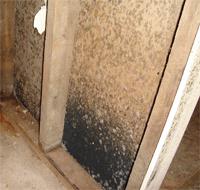I saw this awhile ago, but I'm looking at it again today.
In short, there is evidence that a chemical released by molds can damage dopamine nerve cells
LINK: pnas.org/content/110/48/19561
AUTHORS: Arati A. Inamdar et al.
YEAR: 2013
TITLE:
Fungal-derived semiochemical 1-octen-3-ol disrupts dopamine packaging and causes neurodegeneration
JOURNAL: Proceedings of the National Academy of Sciences
SIGNIFICANCE:
Poor air quality from fungal growth in water-damaged, moldy buildings/residences is correlated with a negative impact on human health. The volatile organic compound 1-octen-3-ol is commonly emitted by molds and is responsible for much of the distinctive moldy odor associated with fungal colonization. Using a Drosophila model, we demonstrate via genetic, biochemical, and immunological studies that 1-octen-3-ol causes dopamine neuron degeneration through disruption of dopamine handling. These data demonstrate that 1-octen-3-ol exerts toxicity via disruption of dopamine homeostasis and may represent a naturally occurring environmental agent involved in parkinsonism. Moreover, it provides possible insights into reported movement disorders associated with human exposure to fungi and their volatile organic compounds.
ABSTRACT:
Parkinson disease (PD) is the most common movement disorder and, although the exact causes are unknown, recent epidemiological and experimental studies indicate that several environmental agents may be significant risk factors. To date, these suspected environmental risk factors have been man-made chemicals. In this report, we demonstrate via genetic, biochemical, and immunological studies that the common volatile fungal semiochemical 1-octen-3-ol reduces dopamine levels and causes dopamine neuron degeneration in Drosophila melanogaster. Overexpression of the vesicular monoamine transporter (VMAT) rescued the dopamine toxicity and neurodegeneration, whereas mutations decreasing VMAT and tyrosine hydroxylase exacerbated toxicity. Furthermore, 1-octen-3-ol also inhibited uptake of dopamine in human cell lines expressing the human plasma membrane dopamine transporter (DAT) and human VMAT ortholog, VMAT2. These data demonstrate that 1-octen-3-ol exerts toxicity via disruption of dopamine homeostasis and may represent a naturally occurring environmental agent involved in parkinsonism.
NEWS ITEM ON THIS RESEARCH: medicalnewstoday.com/articl...
